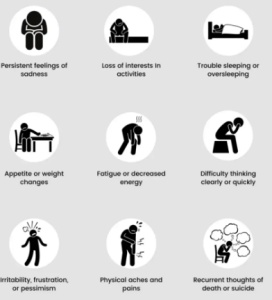Depression is a mental health condition that can affect people of all ages, and as a parent, watching your adult child struggle with its symptoms can be heartbreaking. You may feel helpless, unsure of how to provide support, or even wonder if there’s anything you can do at all. However, your love, understanding, and encouragement can play a crucial role in your child’s journey towards recovery.
Create a safe space for communication
Dr. Raphael Ogbolu, a renowned psychiatrist at Lagos University Teaching Hospital (LUTH), emphasizes the importance of open communication.
“One of the most significant ways parents can support their adult children with depression is by creating a safe, non-judgmental space for them to express their thoughts and feelings,” he explains. “Listen actively, validate their experiences, and let them know that you’re there for them.”

Engaging in activities together, such as going for a walk or preparing a meal, can provide opportunities for meaningful conversations and help your child feel less isolated. Remember, communication doesn’t always have to involve talking; simply being present and showing your love and support can make a world of difference.
Cultivate empathy and understanding
Depression is not a choice, and it’s essential to approach your child’s experiences with empathy and understanding. Onyinye Ifeoma Okeke (PhD), a clinical psychologist, notes that depression can manifest differently for everyone.
“Your child may struggle with tasks that once seemed easy, like maintaining personal hygiene, socializing, or going to work,” she says. “It’s crucial to recognize that these changes are symptoms of their condition, not personal failings.”
Educating yourself about depression can help you better understand what your child is going through and reduce the stigma surrounding mental health. Share your knowledge with others to create a more supportive and understanding environment for your child.
Encourage professional support
While your love and support are invaluable, professional help is often necessary for managing depression effectively.
Dr. Ogbolu advises, “If your child is experiencing severe symptoms, expressing thoughts of self-harm or suicide, or facing a mental health crisis, encourage them to seek immediate professional assistance.”
In Nigeria, resources like the Mentally Aware Nigeria Initiative (MANI) offer free and confidential support through their helpline (08091116264, 08111680686) and online platforms.
The Suicide Prevention Initiative Nigeria (SURPIN) also provides a 24/7 crisis helpline (+234-903-440-0009) for those in need.
Navigate the line between support and enabling
As a parent, it’s natural to want to protect your child from pain and challenges. However, it’s important to recognize the difference between supportive and enabling behaviors. Dr. Okeke cautions, “Enabling can inadvertently reinforce unhealthy patterns and hinder your child’s progress in managing their depression.”
If you’re unsure whether your actions are supportive or enabling, consider working with a family therapist. They can help you find a healthy balance and develop strategies to foster your child’s independence and self-reliance.
Respect boundaries and autonomy
Remember that your adult child is ultimately responsible for their own mental health journey. While you can offer support and encouragement, it’s essential to respect their boundaries and decisions regarding treatment.
Dr. Ogbolu emphasizes, “Autonomy is a crucial aspect of recovery. Allow your child the space to make their own choices, even if you don’t always agree with them.”
Treatment options for depression
Depression treatment typically involves therapy, medication, or a combination of both.
Cognitive-behavioral therapy (CBT) is a highly effective approach that helps individuals identify and change negative thought patterns and behaviors. Antidepressant medications, prescribed by a psychiatrist or medical doctor, can also be beneficial in managing symptoms.
Encourage your child to explore various therapy options, such as interpersonal therapy, art therapy, or problem-solving therapy, to find the approach that resonates with them. If one type of therapy doesn’t seem to be working, they can always try another.
Conclusion
Supporting your adult child through depression can be a challenging and emotional journey, but your love and understanding can make a significant difference in their recovery.
By creating a safe space for communication, cultivating empathy, encouraging professional support, and respecting boundaries, you can help your child navigate this difficult time and emerge stronger on the other side.
Remember, taking care of your own mental health is equally important. Seek support from friends, family, or a therapist when needed, and prioritize self-care to ensure that you can be there for your child in the long run.
With patience, love, and the right resources, you and your adult child can work together to manage depression and build a brighter, more hopeful future.


